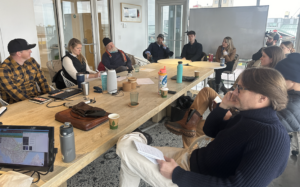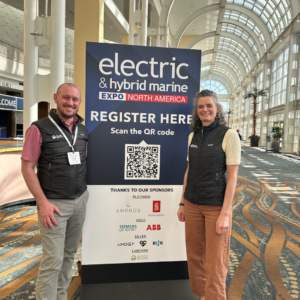
Island Institute hit the road this winter to advance the development of electric marine propulsion along Maine’s working coastline. Advocating for a new technology can take you places: from Machias to Portland, to Long Beach, CA.
We’re seeking solutions to support businesses and community transition away from traditional diesel motors and their associated emissions and unpredictable costs. Through systems level thinking, we’re setting the table for the development of this industry by addressing all barriers in tandem.
At the top of that list of barriers is understanding the current state of, and access to, shore side charging along Maine’s coast. From our big ports to our rural communities, what are the barriers to implementing charging infrastructure and where are the opportunities? Seeking answers to these questions, I hit the road.
In the darkness of early February, I traveled with our partner Noah Oppenheim of Homarus Strategies, to Machias, Ellsworth, Rockland, and Portland to engage with incredibly thoughtful municipal leaders, business owners, and community members. Versant and Central Maine Power were also represented at these meetings. Having them around the table was critical to understanding the grid, grid capacity, and distribution of power for beneficial electrification efforts like electric marine propulsion.
Through thoughtful engagement from participants in each region we visited, we had in-depth discussions about future planning and sighting for infrastructure to support marine facing charging. With some hesitation about the timing of these conversations, given the storms that hit Maine in January, and an evolving trend of flooding and tidal action being more common, I was pleasantly surprised that many saw this time and place as a great opportunity to have big-picture conversations about how Maine’s working waterfronts can be prepared for an electrified future.
A key takeaway from the four meetings is that regional scale planning would optimize shoreside charging support through synergistic efforts for funding, policy, and advocacy. By leveraging the strengths of our islands and peninsulas together, we can streamline technical and financial assistance. By working regionally, we can account for differences in conditions and pivot as needed.

Island Institute is a national leader in systems level thinking around small scale electric workboats and what conditions need to be present for businesses and municipalities to consider the technology. In mid-March, we had the opportunity to share about our work at the International Electric & Hybrid Marine Expo in Long Beach, CA. In a sea of technical presentations, we waved the flag for smaller scale adoption efforts.
It also broadened our horizons. We heard about an impressive project called Zero Emission Network of Workboats (ZENOW) based in the UK. With significant funding secured, they will be placing twenty electric workboats and five shoreside charging units by 2025. Part of their work will be data collection on the workboats, used to inform future investments in electric boats. We also received an update from our friends at Photon Marine, a motor manufacturer from Portland, OR, who recently completed a pilot placement of their all-electric workboat with the NY Power Authority.
Whether in Maine or California, it was amazing to connect with individuals, entities and public and private partners who share the goal of advancing an electrified working waterfront. I look forward to the continuing conversations and work to bring more electric powered boats to Maine’s working coastline!

